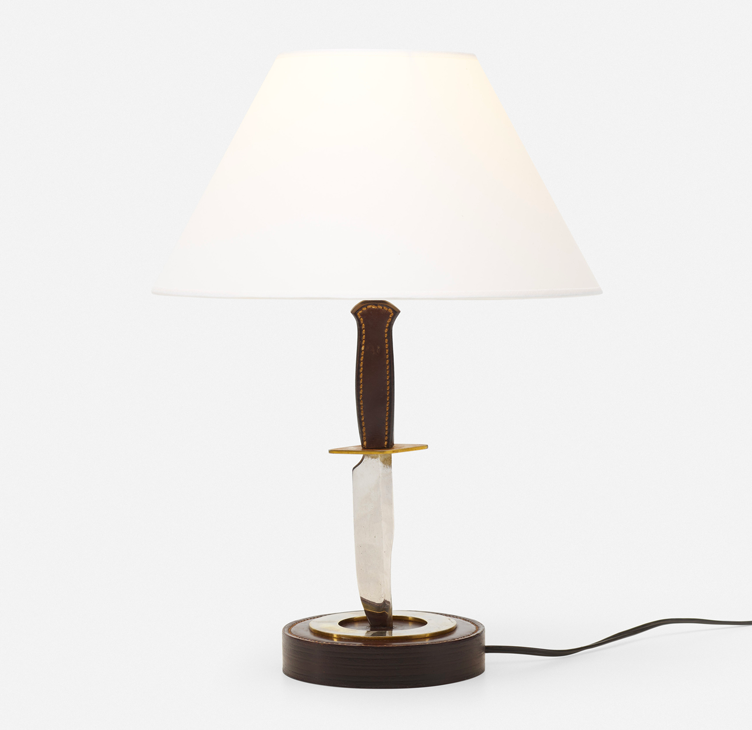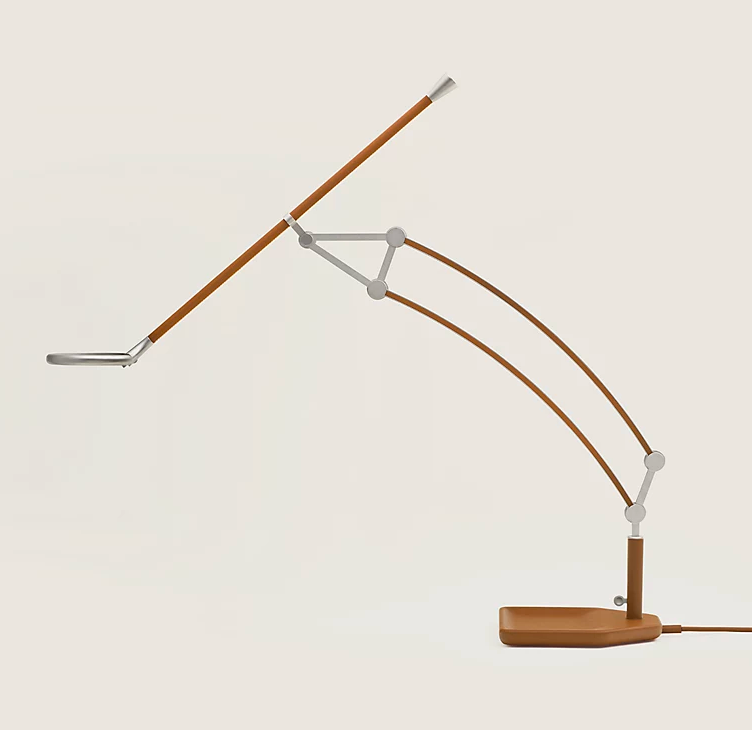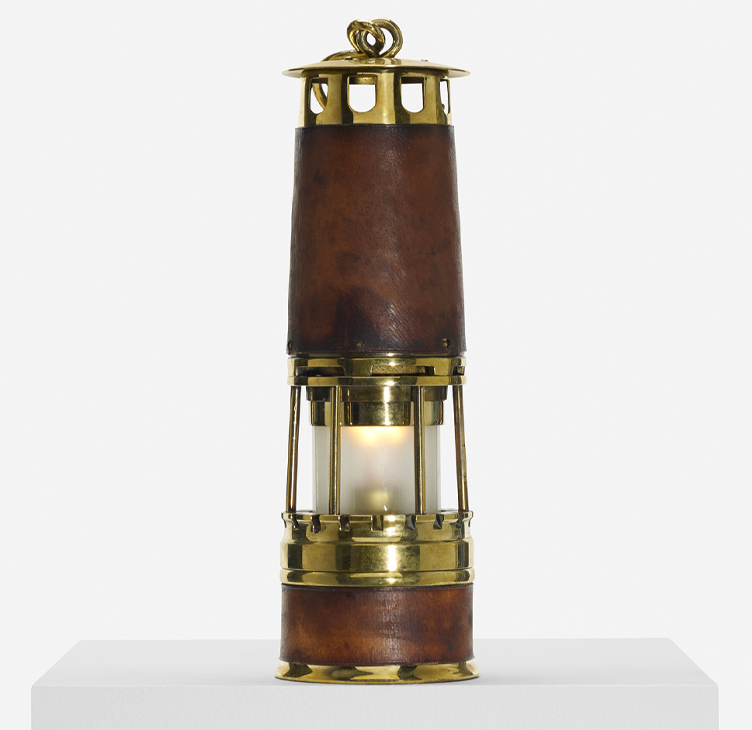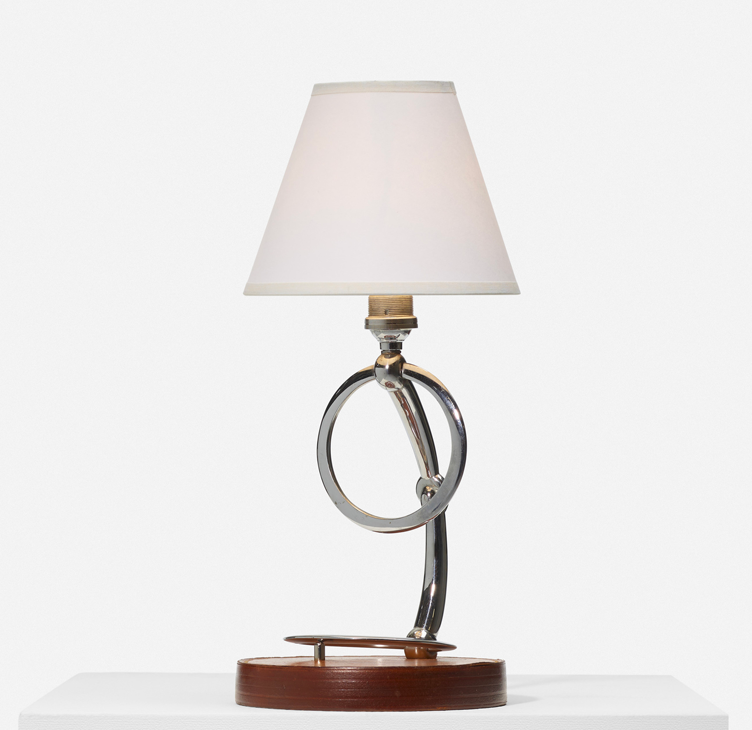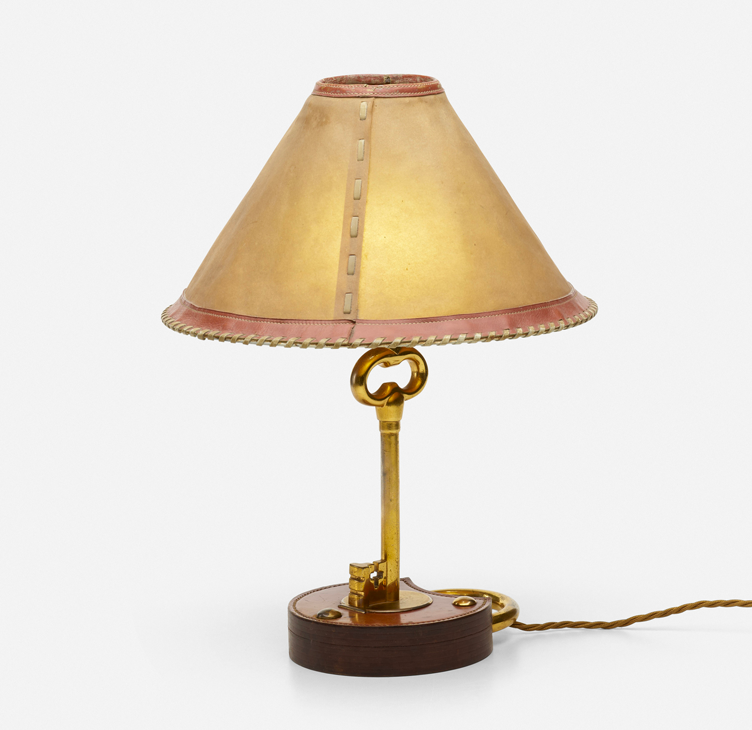Hermès : illuminating the traveller’s way
Founded in Paris in 1837 by Thierry Hermès, the Hermès was originally a harness and saddle manufacturer but quickly diversified its production to all kinds of categories ranging from handbags, jewelries and home decor elements. From the 1920s, Hermès associated his name with prominent designers such as Jean Michel Frank or Paul Dupré-Lafon for whom it supplies different sorts of high quality leathers and, more importantly, it’s know-how when it comes to mastering animal skins.
Hermès
”Knife” Table lamp
France, c. 1950
Stacked box leather, nickel-plated brass, brass, paper
© Wright Auction
The notorious French designer Paul Dupré-Lafon resorted to leather without moderation on all kinds of furniture elements such as sofas, fireplaces, desks as well as table lamps. He applied different stitching methods combined with the best leather coming from all over the world such as Russia or America originating from buffalo, goat, sheep or box-calf. The natural shades of color used to cover his furniture pieces - usually camels, sand color or red - helped to create warm, cozy and luxurious interiors.
Paul Dupré-Lafon and Hermès
Table lamps, pair
France, c. 1935
Stacked box leather, vellum, brass, glass
© Wright Auction
The red box-calf, one of Hermès emblematic leather, was associated with many of Paul Dupré-Lafon creations, giving a warm elegance and reinforcing the purity of the designer’s lines. Among the most famous pieces created in association with Hermès were several table lamp models. They were manufactured with the purpose to create an artificial lighting which stays as close as possible to the natural sunlight. Table feets are saddle stitched and lampshades, crafted in natural pork or goat parchments, broadcast a diffuse and warm light.
Paul Dupré-Lafon and Hermès
Bottom of a Table lamps, stamped “Hermès Paris Déposé”
France, c. 1935
Stacked box leather, vellum, brass, glass
© Wright Auction
In a more industrial style, the Anglepoise lamp, a balanced-arm lamp inspired by vehicle suspensions, designed in 1932 by the British designer George Carwardine has been released with a table wrapped with Hermès leather. Originally designed for working environments, such as workshops and doctors' and dentists' surgeries, it quickly gained popularity among homes.This mix of cold metal and warm leather gives this lamp a unique style, mixing an industrial and comfortable style.
George Carwardine (for Herbert Terry & Sons Ltd) and Hermès
Anglepoise desk lamp
France, c. 1950
Leather over steel, enameled aluminum, brass, chrome-plated steel
© Rago auction
More recently, in 2014, the Pantographe lamp imagined by the Italian designer Michele de Lucchi was released by Hermès and may remind us of the Anglepoise model. Inspired by the architect’s instrument that serves to reduce or enlarge a picture, its metal elements give it a strong industrial flavor but are also reminiscent of whips and the equestrian world.
Pantographe Lamp
Desk lamp covered with taurillon leather
Made in Italy
© Hermès
The Hermès House has always maintained strong ties to its heritage and symbolic themes, one of them being the sea declined in many forms such as on many Carré prints or jewelries with the famous “chaine d’ancre”. Lamps were also inspired from the marine environment from the 1950s with the creation of a ship lantern’s lamp. Others will attribute this lamp as inspired by the one used by diggers at this time but, considering Hermès usual source of inspiration, to link it with the sea world may seem more relevant. Covered in red or leather it is associated with a frosted baccarat glass.
Hermès
Ship's Lantern lamp
France, c. 1950
brass, box leather, Baccarat glass
© Wright Auction
Once again, Hermès drew his inspiration in his past to create recently in collaboration with Yan Kersalé the Lanterne d’Hermès which is reminiscent of lighthouses and navigation lighting. The French visual artist also dove deep into Hermès’ past, exploring the era of horse-drawn carriages, which were also equipped with lanterns in both the front and back.
“Lanterne d'Hermes” lantern
Lantern made up of four individual lanterns covered with taurillon leather
Made in Italy
© Hermès
Hermès house primary world is the cavalry and the famous horse bit design which was also associated with a lamp design in chrome-plated brass and leather from around 1955. The elegant horse bit design is used as the lamp feet and appears in this piece as an elegant design piece itself.
Hermès
Horse Bit table lamp
France, c. 1955
Chrome-plated brass, leather, paper
© Wright Auction
Currently, another lamp inspired from the horse universe is available at Hermès boutiques. Called the Harnais lamps, like the reins on a harness that connect horse and rider, those of the lamps in this collection connect the base to the shade.It is a marriage of saddle-stitched leather and opaline glass fixed with three “clou de selle” studs.
Hermès
Harnais bedside lamp
Taurillon leather, lampshade supported by three leather arms.
Made in Italy
© Hermès
Other unusual lamp designs include two pieces featuring a knife and a key as table lamps, objects which can be associated with as one of travelers essentials. These two models were released in the 1950s and have become rare to come by especially with their original lampshades.
Hermès
Lock and Key table lamp
France, c. 1950
gold-plated brass, stacked box leather, vellum
© Wright Auction


